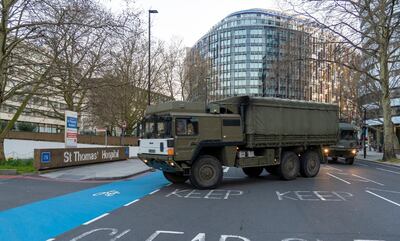Tens of millions of Britons were on Tuesday adjusting to the first day of an indefinite lockdown after the government switched strategies against the spread of coronavirus.
Normally busting streets in London and other major cities were mainly empty.
Among the many who were relieved by the tougher stance was Franki Rubenstein, 86, of Highgate in north London, who said she had known for some time that dramatic steps would have to be taken if lives were to be saved.
“I have been expecting it because people are so stupid," Ms Rubenstein told The National. "They don't listen.
"The TV shows you pictures of them lounging on the beach and I do get frustrated."
She is one of the people most at risk from Covid-19 because of her age and respiratory problems.
“I haven't been going shopping for a while," Ms Rubenstein said. "My daughter who lives nearby has been doing it and she just leaves things at the door."
But the pensioner questioned government advice that the UK’s most vulnerable should stay at home for 12 weeks.
“I want to be as normal as I can so I insist that I will go for a walk every day and I am going to go on doing it,” Ms Rubenstein said.
“I am probably in a much more vulnerable position than most people but I am an incurable optimist.”
Prime Minister Boris Johnson said in a televised address on Monday that unnecessary movement by people was banned for at least three weeks.
The speech from 10 Downing St was one of the most watched in recent memory, with 27 million people tuning in.
“From this evening, I must give the British people a very simple instruction: you must stay at home,” Mr Johnson said.
Shops selling non-essential items, hotels, libraries, playgrounds and places of worship were closed as the UK adopted similar steps to those of European countries.
The uncertainty of how long the lockdown will last has left many businesses in the UK worried.
Glen Brophy recently opened his own hair salon in the east London district of Hackney Wick. Just four months later, he has had to close and cancel his appointments.
“I felt it was the socially responsible thing to do,” Mr Brophy said. “I’m trying to stay positive. Everyone will need to go out to the salon when all this is over.”
People are now allowed to leave their homes only to buy essential items, obtain medical care, take one form of exercise a day, travel to work if it cannot be avoided, or to help a vulnerable person.
On Tuesday morning rush hour, aerial shots of central London showed empty streets.
London’s Underground was different, with passengers posting images on social media of packed train carriages.
Transport for London has decided to keep the Underground open for key workers, such as those in the health system, but has closed some stations.
There have been calls for building sites to be shut down as Underground staff said trains were filled with construction workers.
Self-employed workers were left out of a jobs retention bailout package announced by finance minister Rishi Sunak last week, meaning many construction workers could not afford to stay at home.
So far, 340 people have died of coronavirus in the UK, which has more than 6,700 confirmed cases.
Almost 40 per cent of cases are in London but the infection rate is rising outside the capital.
A doctor in Wales told The National that patients who have tested positive for Covid-19 had started to "pop up everywhere" in the hospital in which she works.
"This will be the defining moment of our careers," she said.
"Consultants who have worked in the National Health Service for years are saying the same. We're very apprehensive about what the next two weeks will bring."
There are about 8,000 ventilators available in the NHS but the government is rushing to have more made.
Doctors have warned that they will have to make tough decisions if Intensive care units are overwhelmed.
London's ExCel conference centre will be turned into a military-supported hospital with two 2,000-bed treatment wards under crisis planning for the next wave of the pandemic.
Matt Hancock, the Health Secretary, said millions of coronavirus diagnosis kits had been bought as the country moved to implement a mass testing plan.
The pressures of child care on those working from home has become another concern for parents.
The government announced the closure of Britain’s schools on March 19.
Only the children of crucial workers such as doctors, nurses, delivery workers and police have continued to go in to study.
Mr Johnson’s Thursday announcement that only essential workers should be travelling to their workplaces has prompted schools to issue further advice.
Douglas Wopshott, 29, a teacher in a western London suburb, said he would not be going into school for the foreseeable future after teachers had been initially told they could go in to collect resources or finish extra work.
“We got an email today to say unless you are on the timetabled rota for the children of key workers you are to stay at home and not come in for anything,” Mr Wopshott said.
He said the school needed to accommodate more pupils than was first anticipated.
“It was far more than they thought,” Mr Wopshott said. His school is close to an NHS hospital.
The secondary school teacher said pupils were settling in to study online at home after a confused and abrupt close to the end of last week.
“You would have thought the kids would have been pleased that they didn't have to do exams but there was a sudden end-of-an-era sort of a feeling," Mr Wopshott said.
"It was like the last day of term. It was pretty emotional.”




















